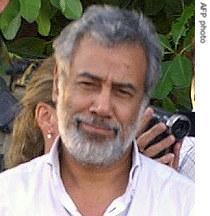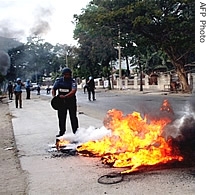-
(单词翻译:双击或拖选)
Jakarta
06 August 2007
Violence erupted in East Timor after former president Xanana Gusmao was appointed prime minister. VOA's Nancy-Amelia Collins in Jakarta reports the nomination1 was made more than a month after parliamentary elections in which no party won a clear majority.

Xanana Gusmao (File)
East Timor President Jose Ramos Horta used his constitutional right to ask a coalition2 of parties led by his predecessor3, Xanana Gusmao, to form a new government.
Mr. Gusmao now becomes prime minister.
The announcement immediately sparked a wave of violence.
U.N. mission spokeswoman Allison Cooper says at least one building in the capital, Dili, was set on fire.
 |
| United Nation peacekeeping soldiers try to control a fire, set on a cycle-van in Dili, 06 August 2007 |
Similar violence was reported in other parts of the country, but there were no immediate4 reports of casualties.
The June 30 parliamentary elections, although contested by 14 parties, boiled down to a race between Mr. Gusmao's CNRT Party and the Fretilin Party, which had controlled the government.
Although Fretilin won more seats than the CNRT, none of the parties won an outright7 majority. Mr. Gusmao's CNRT formed a coalition with several smaller parties to build a majority in the 63-seat parliament.
Fretilin's leader, former prime minister Mari Alkatiri, says it is illegal for the CNRT coalition to form a government. He says Fretilin will not work with the new government.
During the election campaign in June, Mr. Gusmao's party drew huge crowds, in part because of his popularity for his years spent fighting for independence from Indonesia.
East Timor has been struggling to strengthen its fledgling democracy since violence erupted in May 2006, after the firing of around a third of the army. Fighting between rival security forces deteriorated8 into gang looting, arson9, and street fighting. Tens of thousands of people fled Dili to live in refugee camps, where many remain.
Order was restored after the government requested an Australian-led international peacekeeping force, which remains10 in the country. Following the violence, Mr. Alkatiri resigned as prime minister, and was replaced by Mr. Ramos-Horta, who then was elected president in May.
East Timor voted for independence from Indonesia in 1999. After anti-independence militias11 devastated12 the country, the United Nations administered East Timor until it became fully13 independent in 2002.
 收听单词发音
收听单词发音
1
nomination

|
|
| n.提名,任命,提名权 | |
参考例句: |
|
|
|
2
coalition

|
|
| n.结合体,同盟,结合,联合 | |
参考例句: |
|
|
|
3
predecessor

|
|
| n.前辈,前任 | |
参考例句: |
|
|
|
4
immediate

|
|
| adj.立即的;直接的,最接近的;紧靠的 | |
参考例句: |
|
|
|
5
isolated

|
|
| adj.与世隔绝的 | |
参考例句: |
|
|
|
6
sporadic

|
|
| adj.偶尔发生的 [反]regular;分散的 | |
参考例句: |
|
|
|
7
outright

|
|
| adv.坦率地;彻底地;立即;adj.无疑的;彻底的 | |
参考例句: |
|
|
|
8
deteriorated

|
|
| 恶化,变坏( deteriorate的过去式和过去分词 ) | |
参考例句: |
|
|
|
9
arson

|
|
| n.纵火,放火 | |
参考例句: |
|
|
|
10
remains

|
|
| n.剩余物,残留物;遗体,遗迹 | |
参考例句: |
|
|
|
11
militias

|
|
| n.民兵组织,民兵( militia的名词复数 ) | |
参考例句: |
|
|
|
12
devastated

|
|
| v.彻底破坏( devastate的过去式和过去分词);摧毁;毁灭;在感情上(精神上、财务上等)压垮adj.毁坏的;极为震惊的 | |
参考例句: |
|
|
|
13
fully

|
|
| adv.完全地,全部地,彻底地;充分地 | |
参考例句: |
|
|
|















